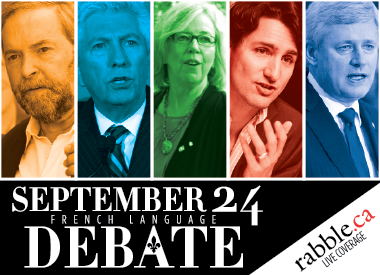Like this article? rabble is reader-supported journalism. Chip in to keep stories like these coming.
Journalists and pundits had speculated that last night’s first French-language leaders debate would be a Tom Mulcair pile on.
It wasn’t.
The five leaders took to the stage at CBC/Radio-Canada in Montreal, each with their varying proficiencies of the French language, and tried to convince French-speakers (read: Québecers) that their party deserved our votes.
Anne-Marie Dussault, host of the show 24/60, coordinated the leaders’ responses to questions posed by Yves Boisvert from La Presse and Patrice Roy from Radio-Canada.
The first section of the debate examined whether or not each of the parties would really be at the service of Canadians, and Roy pressed NDP leader Mulcair to explain how the NDP can promise to improve health care if it’s a provincial responsibility.
Mulcair started off slow but quickly became the most confident and comfortable leader on the stage. This is possibly with the exception of Bloc leader Gilles Duceppe, who mostly played the role of moderator all night, demanding to know what each of the parties would do for Québec.
Unlike in the English debates, the range of issues allowed Mulcair to touch on far greater aspects of the NDP platform than during the Maclean’s or The Globe and Mail debates. Mulcair’s biggest misstep might have been his choice of tie. He otherwise played the role of senior politician very well.
Liberal leader Justin Trudeau started speaking in hushed tones. He was well rehearsed and was the best at bringing the discussion back to his party’s platform. But his language was awkward and he seemed uneasy. He mostly went after Mulcair, leaving Conservative leader Stephen Harper to sit out of a lot of the cross talk.
Harper and Green leader Elizabeth May were by far the weakest during the debate. May has been learning French for only a few years, so my heart goes out to her, but she was incomprehensible for much of the night. It didn’t stop her from challenging Harper when she got the chance. During each intervention, she started strongish and usually trailed off into a mélange of words that was really hard to follow.
Harper’s French seemed to be worse than in years past. He was awkward and easily rattled, especially by Mulcair. Without the veneer of confidence that he relies on to make his extreme arguments sounds rational, he was mostly unconvincing.
Several times, the leaders shot back at one another claiming that what they have said in English was not what they were saying in French.
During the part of the debate that focused on transporting oil, Trudeau said that Canadians need a government that will be an arbitrator, not a cheerleader, for pipelines projects. Harper shot back saying that it was exactly the opposite of what Trudeau said during The Globe and Mail debate in Calgary. (Fact check: Trudeau and Mulcair only mentioned pipelines once during that debate and it was not the opposite of what either of them said in last night’s debate).
This also happened on constitutional questions as the parties tried to trip up Mulcair, a federalist, on his position that a majority constitutes a majority if Québec were to have another referendum.
The NDP remains the party to beat in Québec, and the NDP and Liberals have the most to gain in French-speaking ridings outside of Québec. But Harper needs to pick up a few more seats in Québec if he’s going to secure a majority. Despite the presence of some high-profile candidates (like recently elected caquiste-turned-conservative candidate Gérard Deltell), the Conservative hopes in this province are minimal.
In comparison to the two previous English debates, the French debate felt as if rational minds were finally challenging the positions of Harper. The questions posed to the candidates were wide-ranging and forced them out of the stock speaking notes on the economy that they have all become reliant on.
The French debate was the debate that English Canadians need, though will probably never get, at least not during the rest of this campaign.
For a blow-by-blow reaction to the debate, you can read through the Cover it Live feed here.
For more election coverage, check out rabble’s election issue page.
Nora Loreto is rabble’s resident election fact-checker. Read her fact-check blog here.



